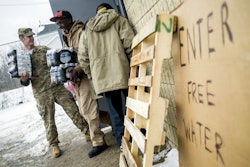FLANDREAU, S.D. (AP) — In a story Jan. 15 about the Dakota Layers chicken farm in Flandreau, The Associated Press reported erroneously that the farm had $450,000 worth of birds. The egg-laying chicken farm has about 450,000 birds total.
A corrected version of the story is below:
Last South Dakota farm hit by bird flu to start selling eggs
The last remaining poultry farm hit by the deadly bird flu in South Dakota has begun production again and plans to be selling eggs shortly
FLANDREAU, S.D. (AP) — The last poultry farm still recovering from last year's deadly bird flu outbreak has begun producing eggs again and plans to start stocking local stores shortly.
Scott Ramsdell, the CEO of Flandreau-based Dakota Layers, said Friday that their eggs will be on local store shelves within a week. He said they're at about 35 percent of their normal production and estimated they won't be back to full production until September.
"It really helps boost morale when you start being able to put some eggs back through and hopefully get back to the norm," he said.
The bird flu led to the deaths of 1.7 million turkeys and chickens in South Dakota and took a toll financially on the state's farmers and processing plants.
The strain that led to deaths of over 50 million birds nationwide hasn't been seen in months, but the U.S. Department of Agriculture said Friday that a different bird flu strain had been confirmed at a commercial turkey farm in southwestern Indiana.
Dakota Layers has bolstered biosecurity in the wake of the virus, and Ramsdell said they're not taking any chances. The company no longer processes eggs laid at facilities other than its own, it has set up three biosecurity zones at its facility and employees who process eggs are required to shower and change clothes when they enter and leave the premises.
Ramsdell said the company has moved its administrative services offsite and is even considering investing in devices to ward off birds flying by.
"I thought we were pretty good before, but now it's even higher," he said.
Dakota Layers was the only egg-laying chicken operation to be affected in the state. All nine of the state's affected turkey farms had restocked by August.
Ramsdell said Dakota Layers tried to retain all of its employees by having them take on tasks such as cleaning or construction, but that it ultimately had to lay off some of them. He said the company has about 450,000 birds and expects to be back to 1.3 million birds by September, when it should be able to hire more workers.
Ramsdell said he feels for the owners of the Indiana farm experiencing the latest outbreak.
"It just scares the heck out of me," he said. "You just can't imagine how devastating it is to a business. You can assume, you can anticipate for it, but when it hits, there's no plan to prepare you."






















